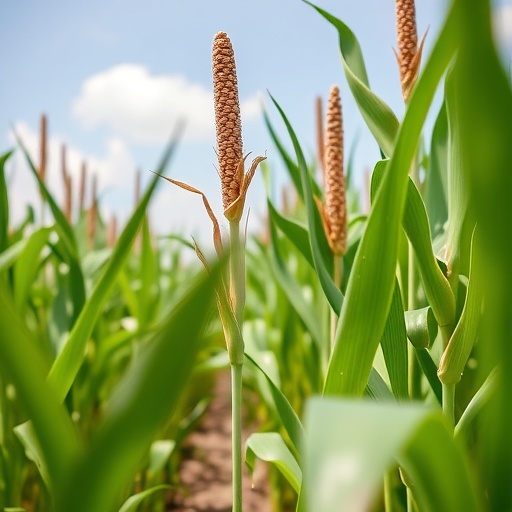In the quest for sustainable agricultural practices, the management of weeds remains a significant challenge for farmers worldwide. Recent research conducted by Singh, Mahajan, and Baite provides an insightful look into the use of dimethenamid-P as a viable solution for weed control, particularly in maize cultivation. This promising herbicide has raised interest due to its selective action against weeds while minimizing the impact on essential crops such as maize (Zea mays L.). The findings of this study were published in the journal Discover Agriculture, highlighting the potential of dimethenamid-P in enhancing crop yields.
Weeds are notorious for their ability to hinder crop production, competing for essential resources such as sunlight, water, and nutrients. This competition can lead to reduced yields and increased production costs for farmers. As such, effective weed management is a critical component of modern agriculture. The conventional methods of weed control often involve mechanical weeding and the application of herbicides. However, the latter can have adverse effects on crop health and the environment. Thus, the exploration of new herbicides that offer effective weed control without detrimental side effects is crucial.
Dimethenamid-P is a pre-emergence herbicide that has emerged as a potential game-changer in weed management strategies. Its mode of action involves inhibiting cell division in target weeds, which renders them unable to germinate and grow. This characteristic makes it particularly valuable in the context of maize cultivation, where maintaining a healthy crop free from weed competition is vital for maximizing productivity.
In the field evaluation conducted by Singh and colleagues, the efficacy of dimethenamid-P was tested under varied conditions to assess its impact on weed control and maize growth. The study set out to determine not only the effectiveness of the herbicide in suppressing weed populations but also to evaluate its influence on the overall growth, health, and yield of maize plants. The results of these experiments were meticulously documented and analyzed, providing invaluable data for farmers considering the integration of this herbicide into their agricultural practices.
The experimental design incorporated different application rates of dimethenamid-P, allowing researchers to gauge the optimal dosage for effective weed control while safeguarding maize crops. Field trials were conducted over several growing seasons, offering a comprehensive overview of how varying environmental conditions may affect the herbicide’s performance. This detailed approach underscores the importance of empirical data in the decision-making process for agricultural management.
One of the standout findings from the research is the herbicide’s selective nature, which significantly favors maize over weed species. This selective action is crucial because it minimizes the risk of damaging the crop while efficiently managing weed populations that pose a threat. Farmers often face the dilemma of choosing herbicides that may control weeds effectively but at the risk of harming their main crops. The favorable results of dimethenamid-P present an opportunity to alleviate this dilemma, providing a safer and more effective option for weed management.
Moreover, the effects on crop yield observed in this study shed light on the broader implications for agricultural sustainability. Maize is a staple food crop in many regions, and increasing its yield without the use of harmful chemicals directly benefits food security. The positive impact of dimethenamid-P on maize growth, as documented in the study, indicates the potential of this herbicide to contribute to more productive and sustainable agricultural systems.
Beyond its effectiveness in weed control and positive influence on crop yield, the research also emphasizes the importance of integrating herbicide use into comprehensive weed management strategies. While dimethenamid-P has demonstrated significant prowess in weed suppression, it is imperative for farmers to consider it as part of a holistic approach that may include cultural practices, crop rotation, and other integrated pest management techniques.
Environmental concerns regarding herbicide use are also an essential aspect of the discussion. The study addresses these concerns by evaluating the potential ecological impact of dimethenamid-P. Researchers aimed to ascertain whether its application would lead to adverse effects on soil health, water quality, and non-target plant species. The careful assessment of these factors is vital for ensuring that the adoption of this herbicide aligns with sustainable agricultural practices.
Singh, Mahajan, and Baite’s research offers a clear path forward for farmers seeking to improve their weed management strategies while being mindful of environmental stewardship. As the agricultural sector faces increasing pressures from population growth and changing climate conditions, the need for effective solutions like dimethenamid-P becomes increasingly urgent. This research not only enhances our understanding of weed control dynamics in maize but also sets the stage for future innovations in crop management.
Ultimately, the findings from this field evaluation signify a noteworthy advancement in agricultural science, advocating for the responsible use of herbicides. As agricultural practices evolve, the integration of novel solutions such as dimethenamid-P may pave the way for a greener and more productive future in crop cultivation.
In conclusion, the pivotal study by Singh and colleagues not only highlights the benefits of dimethenamid-P in weed control and maize growth but also emphasizes the need for ongoing research and innovation in the agricultural sector. By embracing such advancements, farmers can better navigate the complexities of modern agriculture, ensuring food security while promoting environmental sustainability.
Subject of Research: Evaluation of dimethenamid-P for weed control in maize cultivation.
Article Title: Field evaluation of dimethenamid-P for weed control and its effect on maize (Zea Mays L.) growth and yield.
Article References:
Singh, R.K., Mahajan, N.C. & Baite, N.A. Field evaluation of dimethenamid-P for weed control and its effect on maize (Zea Mays L.) growth and yield. Discov Agric 3, 138 (2025). https://doi.org/10.1007/s44279-025-00304-6
Image Credits: AI Generated
DOI:
Keywords: Dimethenamid-P, weed control, maize, crop yield, sustainable agriculture.




